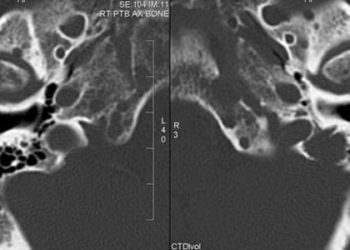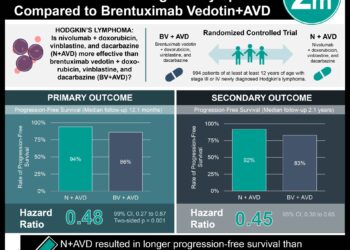Novel β-chain-targeting approach for the treatment of lymphoma [PreClinical]
1. The β-chain constant region of the T cell receptor (TCR) was targeted to specifically eliminate a population of malignant T cells.
2. Engineered chimeric antigen receptor (CAR) T cells with specificity to the β-chain constant region successfully eradicated a significant proportion of malignant T cells in mice.
Evidence Rating Level: 3 (Average)
Study Rundown: Mature peripheral T cell lymphomas are aggressive cancers with a low survival rate. Although chimeric antigen receptor (CAR) T cell therapy has been generated for the treatment of B cell lymphomas, similar therapies for T cells are not currently available. While humans can survive with severely depleted populations of B cells, the same is not true for T cells. Thus, a more specific strategy is needed for the treatment of T cell malignancies. T cell receptors (TCRs) contain 2 genes that encode the constant region of the β-chain, TRBC1 and TRBC2. While the normal T cell compartment contains about 40% TRBC1+ TCRs and 60% TRBC2+ TCRs, malignancies typically contain just one type. This makes the beta chain of the TCR a good target, as it enables the depletion of many malignant T cells without depleting the entire T cell population.
A screening approach was used to generate a monoclonal antibody that specifically targeted TRBC1. This was done by expressing TCRs in either wild-type or mutated format on the surface of T cells in an immortalized T cell line (JKO) in which the α and β chain loci are knocked out. These mutations mapped to regions of the beta chain constant domain that differed in amino acid sequence between the TRBC1 and TRBC2 forms. After confirming the specificity of the antibody, its epitope was used for the generation of TRBC1-specific CAR T cells. When incubated with TRBC1-JKO and TRBC2-JKO cells, the anti-TRBC1 CAR T cells selectively killed TRBC1-JKO cells and not TRBC2-JKO cells. When primary malignant T cells from cancer patients were co-cultured with the anti-TRBC1 CAR T cells, death of malignant T cells was demonstrated. Finally, humanized mice were injected with TRBC1-JKO and TRBC2-JKO cells and treated with anti-TRBC1 CAR T cells. Three weeks following treatment, TRBC2-JKO cells were the predominant T cell population, confirming the in vivo specificity and targeting of TRBC1 by anti-TRBC1 CAR T cells.
This study demonstrates a novel approach of targeting malignant T cells while preserving a population of normal T cells. Though the toxicity of this therapy and its efficacy in humans remain to be determined, this discovery represents a step forward in the development of specific and effective therapeutics for aggressive T cell malignancies.
Click here to read the study in Nature Medicine
Relevant Reading: From empiric to mechanism-based therapy for peripheral T cell lymphoma
In-Depth [animal study]: Antibodies targeting the beta chain constant region of the TCR of the TCR were generated via a screening approach. These antibodies were tested for binding efficacy using TRBC1-JKO and TRBC2-JKO cells. JOV-1 was identified as a monoclonal antibody that selectively bound to TRBC1 with an affinity of 0.42nM with a 10,000 fold weaker binding affinity to TRBC2. Third-generation CAR T cells were then retrovirally transduced with the sequence of the JOV-1 epitope to generate anti-TRBC1 CAR T cells. These CAR T cells were co-cultured with TRBC1-JKO and TRBC2-JKO cells and a chromium release assay revealed significantly increased killing of TRBC1-JKO cells compared to TRBC2-JKO cells (p< 0.05).
Malignant T cells from patients with TRBC1+ malignancies were co-cultured with anti-TRBC1 CAR T cells, and >80% of malignant T cells from patients with T cell prolymphocytic leukemia and peripheral T cell lymphomas were killed.
Finally, the in vivo efficacy of this therapy was assessed with IV injection of Jurkat T cells into NOD-SCID gamma mice. Following stable engraftment of these cells, mice were treated with anti-TRBC1 CAR T cells 10 days after introduction of Jurkat T cells and bioluminescence imaging was performed to visualize remaining Jurkat T cells. A pronounced reduction in TRBC1-expressing Jurkat T cells was noted with significantly increased survival following CAR T cell treatment (p< 0.0001).
Image: PD
©2018 2 Minute Medicine, Inc. All rights reserved. No works may be reproduced without expressed written consent from 2 Minute Medicine, Inc. Inquire about licensing here. No article should be construed as medical advice and is not intended as such by the authors or by 2 Minute Medicine, Inc.







